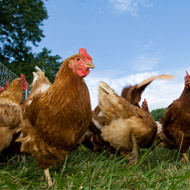
Measures in place to reduce the risk of avian flu will be relaxed in England from 15 May 2017, the UK's chief veterinary officer has announced.
The news follows the latest risk assessment from Defra which found that the overall risk in England has fallen from ‘medium’ to ‘low’. Defra states that this is comparable with risk levels in November 2016, and should continue to fall in warmer, drier conditions.
‘Based on this assessment, the decision has been taken to lift measures on 15 May, provided there are no further cases in poultry or findings of H5N8 in wild birds,’ Defra said in a press release.
The measures that are due to be relaxed include the avian influenza prevention zone. From 15 May, keepers will no longer be required to follow specific disease prevention measures to reduce the risk of infection from wild birds.
Defra says that keepers should continue to follow industry standard best practice on biosecurity. This includes minimising movement in and out of bird enclosures, cleaning footwear, keeping areas where birds live clean and tidy and feeding birds outside.
The ban on poultry gatherings, which have been in place since December 20, will also be lifted. This means that bird gatherings can then resume, subject to some additional identity and health checks and biosecurity measures.
Protection zone covering Scotland
Today (28 April) Scotland also announced plans to lift the avian influenza protection zone. From 30 April 2017, keepers will be able to let their birds outside. However, the ban on shows and gathering of poultry, waterfowl and game birds will remain in force until 15 May.
Scotland’s chief veterinary officer Sheila Voas said: “It is a relief to see that the risk of HPAI H5N8 in Scotland has reduced, but this does not mean we should be complacent; the risk of avian influenza has not disappeared. It is essential that bird keepers maintain effective biosecurity year-round, not just when a prevention zone is in place.
“All bird keepers should consider maintaining excellent biosecurity practices like washing boots and equipment with approved disinfectant, implementing effective rodent control, minimising unnecessary visitors and reducing their flock’s contact with wild birds.
“I would also strongly urge businesses to reassess their contingency plans, given the new perspective this season’s outbreaks of H5N8 provides. Practical advice about their specific arrangements should be sought from their private vets, in consultation with their local Animal Plant and Health Agency office.”
Northern Ireland extends prevention zone
In Northern Ireland, the Department of Agriculture, Environment and Rural Affairs has confirmed that the avian protection zone is being extended until 31 May 2017.
The current prevention zone, which expires at 11.59pm on 30 April, gives keepers in all areas of Northern Ireland the option to let their birds outside - subject to them complying with additional biosecurity mitigation measures.
Ahead of the implementation of the new prevention zone on Monday 1 May, Northern Ireland’s chief veterinary officer Robert J Huey is reminding all bird keepers to remain vigilant. In a statement he said:
“The risk of infection from wild birds is decreasing and is expected to continue to decrease in the coming weeks. The decision to extend the prevention zone until the end of May has been made following a recent veterinary risk assessment which concluded that there is still a risk of avian influenza to poultry through direct or indirect contact with wild birds, although the risk has decreased.



 The BSAVA has opened submissions for the BSAVA Clinical Research Abstracts 2026.
The BSAVA has opened submissions for the BSAVA Clinical Research Abstracts 2026.